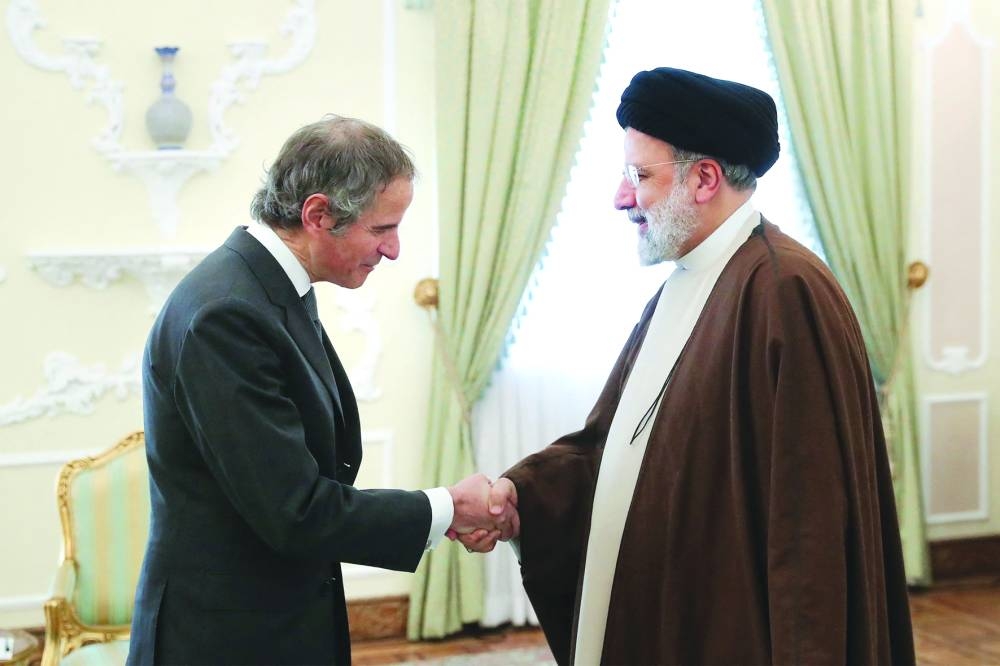Iran has given sweeping assurances to the UN nuclear watchdog that it will finally assist a long-stalled investigation into uranium particles found at undeclared sites and even re-install removed monitoring equipment, the watchdog said yesterday.
The International Atomic Energy Agency and Iran issued a joint statement on IAEA chief Rafael Grossi’s return from a trip to Tehran just two days before a quarterly meeting of the agency’s 35-nation Board of Governors.
The statement went into little detail but the possibility of a marked improvement in relations between the two is likely to stave off a Western push for another resolution ordering Iran to co-operate, diplomats said. Iran has, however, made similar promises before that have yielded little or nothing.
“Iran expressed its readiness to ... provide further information and access to address the outstanding safeguards issues,” the joint statement said. A confidential IAEA report to member states seen by Reuters said Grossi “looks forward to ... prompt and full implementation of the Joint Statement”.
Iran is supposed to provide access to information, locations and people, Grossi told a news conference at Vienna airport soon after landing, suggesting a vast improvement after years of Iranian stonewalling.
Iran would also allow the re-installation of extra monitoring equipment that had been put in place under the 2015 nuclear deal, but then removed last year as the deal unravelled in the wake of the US withdrawal from the deal in 2018 under then-President Donald Trump.
Follow-up talks in Iran between IAEA and Iranian officials aimed at hammering out the details would happen “very, very soon”, Grossi said.
Asked if all that monitoring equipment would be re-installed, Grossi replied “Yes”. When asked where it would be re-installed, however, he said only that it would be at a number of locations.
He said talks were ongoing with Iran on two sets of important matters, including the science sector, and there was “great expectation” about the process.
“Globally speaking, there are two sets of matters that are important. Clearly, there is great expectation about our joint work in order to move forward in the issues that Iran and the agency are working on, to clarify and to bring credible assurances about the nuclear programme in Iran,” Grossi told reporters in Tehran.
“The second set of issues, which is very important, has to do with (the) scientific, technical co-operation we are having and will continue to have with Iran,” he said, speaking alongside Mohamed Eslami, head of the Atomic Energy Organisation of Iran.
Grossi said the talks were taking place in an “atmosphere of work, honesty and co-operation”.
His visit comes amid contacts with Tehran on the origin of the uranium particles enriched to up to 83.7% purity, very close to the 90% threshold for weaponisation, at its underground Fordow enrichment plant, according to a report by the UN nuclear watchdog seen by Reuters.
Eslami told reporters yesterday that the Islamic Republic was enriching uranium up to 60% fissile purity.
Grossi later met President Ebrahim Raisi and “expressed satisfaction with achieving a joint agenda with the Atomic Energy Organisation on measures to smooth the path of co-operation”, Raisi aide Mohamed Jamshidi tweeted.
Raisi added that “co-operation is a bilateral matter, which could continue based on maintaining the independence of the IAEA and the rights of the Iranian nation”, Jamshidi added.
Region
Iran in sweeping pledge to co-operate with IAEA
Iran has given sweeping assurances to the UN nuclear watchdog that it will finally assist a long-stalled investigation into uranium particles found at undeclared sites and even re-install removed monitoring equipment, the watchdog said yesterday.

Iranian President Ebrahim Raisi (right) welcoming IAEA chief Rafael Grossi ahead of their meeting in Tehran yesterday. (AFP)
